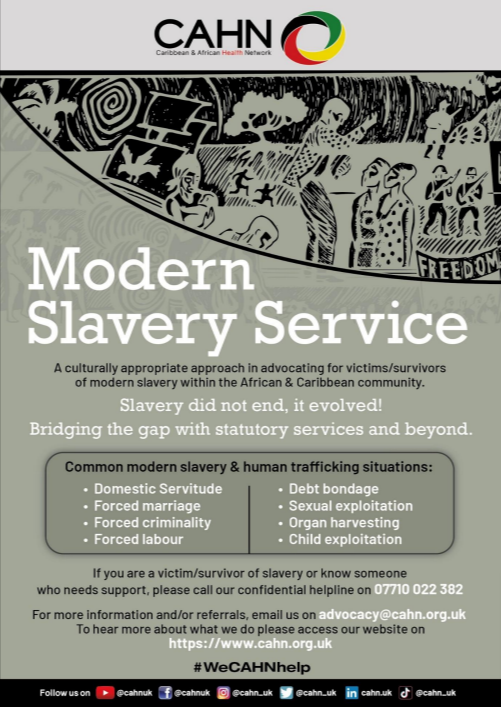
Modern Slavery can include human trafficking. This is when an individual is exploited by others, for personal or commercial gain. Whether tricked, coerced, or forced, they lose their freedom.
Modern Slavery can include human trafficking. This is when an individual is exploited by others, for personal or commercial gain. Whether tricked, coerced, or forced, they lose their freedom.
Human Trafficking is the recruitment, transportation, transfer, harbouring or receipt of people through force, fraud, coercion, or deception, with the aim of exploiting them for profit.
People don’t have to be transported across borders for trafficking to take place. Trafficking is defined by the movement of a person, and this can happen within a single country or even within a single community.

The Modern Slavery bill as described by the government:
“The Modern Slavery Act will give law enforcement the tools to fight modern slavery, ensure perpetrators can receive suitably severe punishments for these appalling crimes and enhance support and protection for victims. It received Royal Assent on Thursday 26 March 2015.
The act will:
• consolidate and simplify existing offences into a single act
• ensure that perpetrators receive suitably severe punishments for modern slavery crimes (including life sentences)
• enhance the court’s ability to put restrictions on individuals where it’s necessary to protect people from the harm caused by modern slavery offences
• create an independent anti-slavery commissioner to improve and better coordinate the response to modern slavery
• introduce a defence for victims of slavery and trafficking
• place a duty on the secretary of state to produce statutory guidance on victim identification and victim services
• enable the secretary of state to make regulations relating to the identification of and support for victims
• make provision for independent child trafficking advocates
• introduce a new reparation order to encourage the courts to compensate victims where assets are confiscated from perpetrators
• enable law enforcement to stop boats where slaves are suspected of being held or trafficked
• require businesses over a certain size to disclose each year what action they have taken to ensure there is no modern slavery in their business or supply chains”
Source: https://www.gov.uk/government/collections/modern-slavery-bill
A culturally appropriate approach in advocating for victims/survivors of modern slavery and human trafficking within the African & Caribbean community, it’s a safe and confidential service.
At CAHN, we provide independent advocacy and well-being services, alongside emotional support through our counselling team. We do not represent our own views at any point but amplify that of our relevant service users. We empower our clients to advocate for themselves wherever possible and signpost them to appropriate services when required and agreed upon with the client.
Slavery did not t end, it evolved!
Bridging the gap in mainstream services.
Common modern slavery & human trafficking situations:
• Domestic Servitude
• Forced marriage
• Forced criminality
• Forced labour
• Debt bondage
• Sexual exploitation
• Organ harvesting
• Child exploitation
1. What are the signs of Modern Slavery
Do you know how to spot the sign of modern slavery and human trafficking? If not, these are some of the indicators that you can watch out for within your community:
– Restricted freedom of movement
– Isolation – may appear to be under the control of others
– May be controlled through religion, witchcraft, juju etc
– Poor physical appearance – including untreated injuries, and nervous behaviour (i.e. anxiety)
– Reluctance to seek help – fear of authorities
– Poor living conditions – living and working in the same place
– Unusual travel arrangements – always having someone pick them up and drop them off at odd times.
– The person is living somewhere with bars on the window, boarded windows, or curtains constantly drawn
– Reluctance to make eye contact
– Unaware of home address
– No access to their own documents
2. How we can help
We can help bridging gaps and rebuild the long-lost trust between service users from the African and Caribbean communities and statutory services.
We attend meetings with our service users for support either face-to-face, virtual or
the method that is best in line with the client’s needs.
As part of our services, we offer support in various languages: French, English, Lingala, Swahili, Portuguese, Spanish etc.
We hold regular update meetings with our service users, so they understand the process at each stage.
3. Useful resources:
a. Modern Slavery Fund review: Modern Slavery Fund review – GOV.UK (www.gov.uk)
b. 2021 UK annual report on modern slavery: 2021 UK annual report on modern slavery – GOV.UK (www.gov.uk)
c. Modern slavery awareness booklet: Modern slavery awareness booklet – GOV.UK (www.gov.uk)
4. Referral for victims of modern slavery
If the above sounds like you or someone you may know, provided you have their consent please complete our referral form.
Please provide as much information as possible. It will be stored in a safe place and
used as the basis for providing support for the person referred.
For further information, please contact us on:
Helpline: 07710 022 382
Email: advocacy@cahn.org.uk